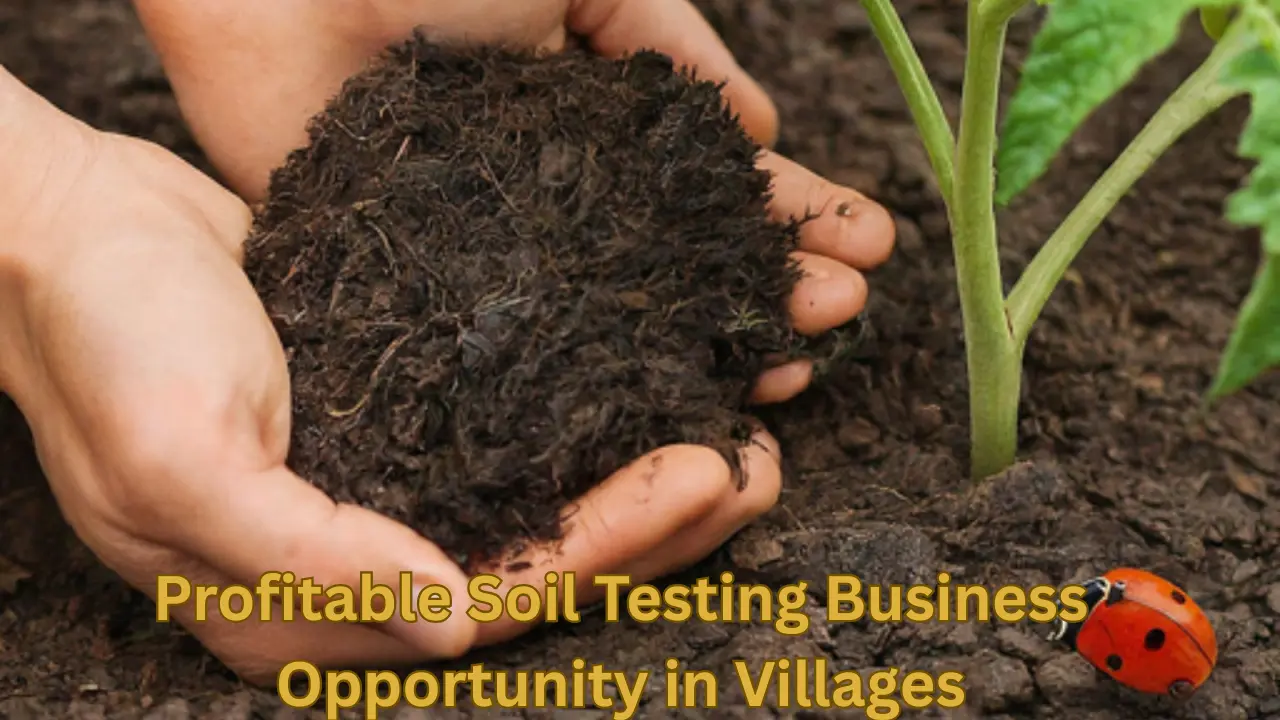Table of Contents
Profitable Soil Testing Business in Indian Villages is emerging as a game-changing option for aspiring rural entrepreneurs in India. As the demand for precision agriculture soil testing services have become vital to ensure high productivity and responsible land use.
Across India, over 665 village-level soil-testing labs have been established by February 2025 under the Soil Health Card program—boosting soil fertility and yield in thousands of villages.
But here’s the twist: Most rural areas still lack access to reliable testing. That’s where your business opportunity lies. Whether you launch a mini fixed lab or a mobile testing van, you can earn ₹15,000–25,000/month while empowering local farmers—especially since the government covers up to 75% of lab setup costs .
In this 1,500-word guide, you’ll learn:
- Why soil testing matters in agriculture
- Go/no-go models (lab vs mobile)
- Government programs & subsidies
- Step-by-step setup
- Tools, tech, and equipment
- How to make real revenue
- Tips to scale and sustain your business
What is a profitable soil testing business opportunity in villages?
A profitable soil testing business opportunity in villages involves offering scientific soil analysis services to farmers to help them enhance crop yield, reduce input costs, and promote sustainable farming. It requires minimal investment, technical know-how, and delivers high demand in rural regions.
Why Soil Testing is a Thriving Business in Villages
1. Reduces Cost and Increases Yield
Soil testing helps farmers apply fertilizers efficiently, reducing wastage and saving money. It improves crop quality, increases yield, and prevents overuse of chemicals.
2. Builds Healthier Soil for Future Farming
Regular testing prevents soil degradation, enhances fertility, and promotes sustainable agriculture. It also helps detect contamination and suggests corrective measures.
3. High Demand in Rural India
Despite several government programs, many villages still don’t have accessible testing services. Farmers are willing to pay for accurate and quick soil analysis, especially before sowing.
Choosing the Right Business Model
A. Fixed Mini Soil Testing Lab
- Setup cost: ₹5 lakh approx.
- Government subsidy: Up to 75% (You may invest only ₹1.25 lakh)
- How it works: Farmers bring soil samples to your lab. Reports are provided in 2–3 days.
- Earning potential: ₹300 per test. With 50 tests per month, you can earn ₹15,000 or more.
B. Mobile Soil Testing Van
- Setup cost: ₹2–3 lakh approx.
- How it works: You visit villages and test soil on-site using portable devices.
- Faster service: Results within 45 minutes.
- Earning potential: ₹200–250 per test. You can test 8–10 samples per day.
Tip: If you’re starting small, the mobile model is affordable and more flexible.
Government Support & Subsidy
1. Soil Health Card Scheme
The government promotes rural soil testing through schemes that offer financial support, training, and lab infrastructure. You can apply at your district agriculture office.
2. Who Can Apply
- Indian citizen aged 18–40
- At least 10th pass
- Preferably with an agricultural background or interest
3. Required Documents
- Aadhar Card
- Education certificate
- Site proof (for lab setup)
- Business plan (recommended)
4. Training & Certification
You can take short courses in soil testing from agriculture universities, Krishi Vigyan Kendras (KVKs), or recognized NGOs to build credibility.
Equipment, Technology & Infrastructure
For Fixed Labs:
- Soil pH meter
- EC meter (electrical conductivity)
- Spectrophotometer
- Soil moisture analyzer
- Glassware & chemicals
- Printer & computer
- Safety gear
For Mobile Units:
- Portable digital soil tester kits
- Battery-powered equipment
- Basic reporting tools (mobile app or Excel)
- Vehicle or cart outfitted for lab use
Setup Area Required:
- Lab: 100–200 sq. ft. with electricity and water
- Mobile van: Small commercial vehicle or even a modified rickshaw
Step-by-Step Setup Guide For Profitable Soil Testing Business in Indian Villages
Step 1: Conduct Market Research
Survey 3–5 nearby villages. Ask farmers if they test soil, where they go, how much they pay, and how long it takes to get results.
Step 2: Apply for Subsidy
Visit your local agriculture office, collect application forms, and submit necessary documents. Follow up to ensure processing.
Step 3: Choose Business Model
Decide between mobile or fixed lab based on your budget, skills, and local demand.
Step 4: Purchase Equipment
Buy standard soil testing kits and lab instruments from trusted suppliers. Ensure you get calibration and user manuals.
Step 5: Complete Training
Take a 7–10 day course to learn testing methods, sample handling, safety, and report preparation.
Step 6: Launch Your Business
Offer initial tests at discounted rates to build trust. Promote through word-of-mouth, flyers, and demo sessions.
Step 7: Maintain Records & Improve
Keep digital records of test reports, farmer feedback, and earnings. Use this to improve service and scale operations.
Earning Potential & Profit Breakdown
Fixed Lab Model:
- 50 samples/month × ₹300 = ₹15,000
- Expenses: electricity, chemicals, marketing = ₹3,000–₹4,000
- Net profit: ₹10,000–₹12,000/month
Mobile Model:
- 200 samples/month × ₹200 = ₹40,000
- Fuel, maintenance, kits = ₹5,000–₹7,000
- Net profit: ₹30,000+ per month
With value-added services (crop suggestions, fertilizer consulting), income can go even higher.
Marketing & Growth Strategy
1. Village Demos
Set up tents during market days, panchayat meetings, or agri-events. Show live soil testing and explain benefits.
2. Partner with Local Agri Stores
Tie up with seed and fertilizer shops. Ask them to refer farmers for testing in exchange for commission or co-marketing.
3. Use WhatsApp & Print
Create local-language flyers. Start a WhatsApp group for farmers to share updates, offers, and results.
4. Ask for Testimonials
Show before-after examples of yield improvement after testing. Use this to build social proof.
5. Expand Services
Once established, add:
- Fertilizer recommendation services
- Compost and bio-fertilizer sales
- Crop consultation
Real Success Stories
A young entrepreneur from a village started a mobile soil testing van with basic equipment and covered 5 nearby villages. In the first 3 months, he tested over 300 samples and built partnerships with agri-input dealers.
🔢 7 Profitable Soil Testing Business Opportunity in Villages
1️⃣ Mobile Soil Testing Laboratory
Setting up a mobile van equipped with basic testing tools allows you to reach farmers in multiple villages, offering doorstep service and quick results.
2️⃣ Fixed Soil Testing Center
Establish a small lab in a central village location where farmers can bring samples for analysis. This model ensures consistent footfall and repeat clients.
3️⃣ Organic Farming Advisory Add-On
Combine soil testing with guidance on organic farming practices, helping farmers reduce dependency on synthetic inputs while boosting your income through consultancy fees.
4️⃣ Precision Fertilizer Recommendation Service
Offer detailed soil reports with custom fertilizer plans, enabling farmers to optimize input use and increase productivity — a highly valued service.
5️⃣ Contract Soil Testing for Agri Cooperatives
Partner with local farmer producer organizations (FPOs) or cooperatives to provide bulk soil testing at discounted rates, ensuring stable revenue.
6️⃣ Educational Workshops and Training
Host soil health workshops, charging fees or partnering with NGOs/government agencies. This builds trust and can convert attendees into long-term clients.
7️⃣ Value-Added Testing (Water + Soil + Plant Tissue)
Expand your service portfolio to include water quality and plant tissue testing, offering farmers a comprehensive crop health package.
📊 Estimated Costs & Earnings Table
| Expense/Income Item | Estimated Cost (INR) |
|---|---|
| Basic Lab Equipment | ₹1,00,000 – ₹2,00,000 |
| Mobile Van Setup | ₹2,50,000+ |
| Monthly Operating Cost | ₹15,000 – ₹30,000 |
| Average Per Farmer Charge | ₹200 – ₹500 |
| Monthly Revenue (100+ farmers) | ₹20,000 – ₹50,000+ |
💡 How to Market Your Soil Testing Business
- ✅ Conduct free awareness camps in nearby villages.
- ✅ Use social media (Facebook, WhatsApp groups) to reach local farmers.
- ✅ Partner with agri input shops for referrals.
- ✅ Offer seasonal packages and discounts for bulk testing.
Related post: Government Subsidy Business Ideas in India
🌟 Final Thoughts
Starting a profitable soil testing business opportunity in villages is not just a smart business decision — it’s a way to contribute to sustainable agriculture and rural prosperity. By combining technical expertise with strong customer service, you can build a rural startup that makes a meaningful impact.
📌 FAQs
What is the minimum investment required for a soil testing business in villages?
The minimum investment can range from ₹1 lakh to ₹3 lakh, depending on whether you set up a fixed lab or mobile unit.
Do I need a license to start a soil testing lab?
Yes, it’s advisable to register under MSME/Udyam and obtain local licenses for agri-based services. Certification from agricultural authorities adds credibility.
How much can I earn from a soil testing business in villages?
Monthly income can range from ₹20,000 to ₹50,000+, depending on your client base and service portfolio.
How can I attract farmers to use soil testing services?
Organize awareness camps, offer first-time discounts, and partner with agri input shops or cooperatives for referrals.
Can I run this business part-time?
Yes, with a small fixed lab or mobile setup, you can operate part-time, especially during peak farming seasons.







